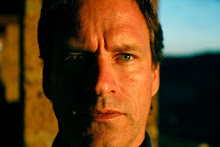Wednesday, May 13, 2009
A tale of survival
I am continually amazed and the resilience and spiritual power of the native people of the Americas. While most American Indian history is written as though the tribes were dead and gone, I thought "Selling Your Father's Bones" was notable for its inclusion of the living Nez Perce in the retelling of the story of their forced exodus. This review was in the May 10 Books section of the Minneapolis Star Tribune.
Tuesday, May 5, 2009
Transition time
On Friday May 1, I graduated from the Ted Scripps Fellowship in Environmental Journalism. It was an amazing year, and I will be counting the gifts that come from it for the rest of my life. In nine months, I took six graduate school courses in six departments: Philosophy, law, religious studies, journalism, art history and biology. I also took a class on yogic meditation at Naropa University, one of two Buddhist universities in the United States. Being back in school as an adult was fun; I didn't feel any of the pressure or anxiety I did during the first go around. At this point, I realize how much a privilege learning is, and what a joy.
At times, though, what I learned was a grim litany. I already had a strong sense that the Earth is in a period of transition; that human industry has transcended the forces we normally think of as nature as a driving force of planetary change. But week after week, as we met with the nation's top scientists on climate change (primarily from National Oceanic and Atmospheric Administration and the National Center for Atmospheric Research, both based here but also from the University of Colorad0) we heard things are worse than the public knows. The scientists we met weren't polemicists or demagogues, they were quiet people who study the historical record, who analyze variables and look at the conclusions. To a person, they all said we're cooked, the question is how bad will it be?
This isn't the place to go into the specifics. But we all have to face the question of what to do. Consume less and reproduce less are the most immediate and practical answers. There is a temptation to throw up one's hands because the task is so enormous. It's worth trying though. Every act of love, every stretch of the imagination, every breath, in fact, brings home the beauty of the world, and to the point that we are a part of it, not apart from it.
At times, though, what I learned was a grim litany. I already had a strong sense that the Earth is in a period of transition; that human industry has transcended the forces we normally think of as nature as a driving force of planetary change. But week after week, as we met with the nation's top scientists on climate change (primarily from National Oceanic and Atmospheric Administration and the National Center for Atmospheric Research, both based here but also from the University of Colorad0) we heard things are worse than the public knows. The scientists we met weren't polemicists or demagogues, they were quiet people who study the historical record, who analyze variables and look at the conclusions. To a person, they all said we're cooked, the question is how bad will it be?
This isn't the place to go into the specifics. But we all have to face the question of what to do. Consume less and reproduce less are the most immediate and practical answers. There is a temptation to throw up one's hands because the task is so enormous. It's worth trying though. Every act of love, every stretch of the imagination, every breath, in fact, brings home the beauty of the world, and to the point that we are a part of it, not apart from it.
Subscribe to:
Posts (Atom)

